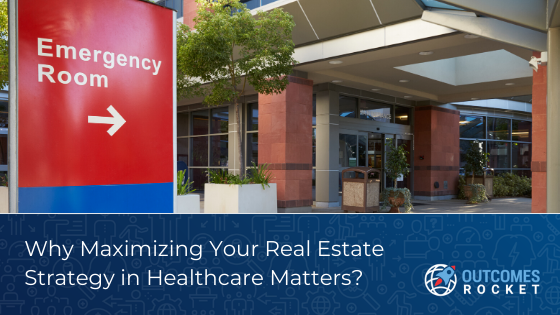
While compassion, patient care, and dedication to altruistic aims are at the forefront of many people’s minds when it comes to hospitals most hospital administrators think about something else – revenues and expenses. Hospitals and health care facilities are like any other business. They have administrative costs, labor costs, capital expenses, overhead expenses, etc.
If you’re running a healthcare facility, one of the many things you’re probably worrying about is how to lower expenses.
What are some of the things you can reduce?
Colin Carr, founder, and CEO at CARR Healthcare Realty has a suggestion — investigate your real estate cost.
In our podcast interview, Colin said that real estate dramatically affects both the overhead expenses and profitability of healthcare – both sides of the coin.
“Health care providers know that real estate is expensive, but they don’t realize that it is usually the second or third highest expense. Payrolls are number one. There are time capital equipment or operating costs that could take the number two slot. But if you look at health care providers’ practices over a 20 to a 30-year period, real estate typically occupies the second position.”
He explains that the kind of deal you get when you buy or rent space can have an impact on your finances, especially when you look at it over a period. You could be losing hundreds of thousands of dollars in savings or paying an additional overhead if you don’t score favorable terms.
“If you’re looking at overhead costs, payrolls are minimally negotiable. Real estate is 100% negotiable and you have the ability to choose where you occupy, where you locate, whether you would have a property, and whether you leased or own.”
Healthcare cost is on the rise. It can be difficult to deliver high-quality effective care while keeping expenses to a minimum. Maintaining a healthcare facility alone plus taking care of bill processing can already eat a large portion of the budget.
When you get the right terms of your real estate healthcare transaction, you could be saving thousands of dollars and pouring that into the care section.
Colin shared the story of a dentist who’s renting a clinic in a multitenant building owned by dental specialists. He’s paying about $29 dollars a square foot and his lease came up for renewal. The owner informed him that since he’s been a good tenant and a friend, they are just going to keep the lease rate at the same amount.
The lessee called Colin just to check the numbers and see if his rate is okay. On the surface, everything seems equitable, but they later found out that there is a vacant space on the first floor that’s being marketed at $19 per square foot. They went to the market, found other options, called the bluff, and was able to get a better deal.
For a 150 sq. ft medical space and if the lease is for five years, that’s a $90,000 difference! What if the space you’re renting is bigger? What if you plan to sign a longer lease? You could be making a huge mistake if you sign on a real estate contract without consulting a real estate healthcare professional.
“It’s important to go into a transaction knowing that if you make a small mistake. It will cost you tens of thousands. A $1000 is not an exaggeration. That’s the real number. They take a couple of dollars per square foot times, a couple of thousand square feet times five or 10 years. It’s a lot of money, but you go into the transaction and realize that every party is out for their own benefit.”
“If you’re going up against sophisticated landlords that negotiate professionally for a living, they have an upper hand. You’ve got to find a way to level the playing field so that you can capture the best care for your practice.” Colin further explained.
If your experience in real estate is limited and if your knowledge of the local real estate market is lacking, then there is wisdom in consulting with experts like Colin Carr. Having a healthcare real estate professional means you have someone at the negotiation table looking out for your interests. It also means getting a good deal, which could lead to thousands of dollars of savings on your overhead expenses.
Listen to my full conversation with Colin Carr when you visit this link: https://outcomesrocket.health/carr/2020/03/.
Discover more engaging stories in healthcare. Visit us https://outcomesrocket.health/ today.
According to the 2020 Centers for Disease Control and Prevention report, roughly 34.2 million Americans have diabetes,...
Read MoreAs a farmer, Rod was used to long days. He worked 18 hours a day, 7 days...
Read MoreWith investors receiving hundreds of pitch decks every year, how do you create a compelling presentation that...
Read More
Brittany Busse Co-Founder, President, and Chief Medical Officer at
ViTelHealth


Stephen Thorne Founder and CEO at
Pacific Dental Services

Keith Carlson Nurse Career Coach